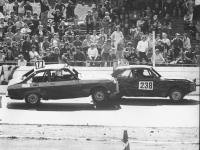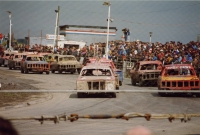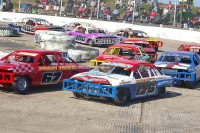History.
Last Updated by Admin 07 August 2019 18:32
 The Saloon Stock Car formula first appeared in 1968, when promoters Spedeworth felt there was a call for a Stock Car class that the watching public could relate to, as their Formula Two Stock Car class transformed during the 1960’s from one based on a small road car to purpose built open-wheeled cars. Thus, they were re-named ‘Superstox’, and the Saloons were introduced simply as ‘Stock Cars’ and they had their first meeting at the original Aldershot Stadium. With the availability of cars being vast, it was an instant success with MG Magnette’s, Austin A60’s, Morris Minors and the like all taking to the track with only a limited amount of ironwork and preparation. Spedeworth had a large number of tracks at that point in time and the new formula Stock Cars rapidly spread across all of them in their regions from the south of England, East Anglia and Scotland. Some drivers transferred across from the F2 cars such as Eddie James and Aubrey ‘Foxy’ Dance and became early stars along with names such as ‘Gentleman’ Jeff Munn, Graham North, Bob Studd, ‘Gray’ Davis and ‘Duffy’ Mick Collard.
The Saloon Stock Car formula first appeared in 1968, when promoters Spedeworth felt there was a call for a Stock Car class that the watching public could relate to, as their Formula Two Stock Car class transformed during the 1960’s from one based on a small road car to purpose built open-wheeled cars. Thus, they were re-named ‘Superstox’, and the Saloons were introduced simply as ‘Stock Cars’ and they had their first meeting at the original Aldershot Stadium. With the availability of cars being vast, it was an instant success with MG Magnette’s, Austin A60’s, Morris Minors and the like all taking to the track with only a limited amount of ironwork and preparation. Spedeworth had a large number of tracks at that point in time and the new formula Stock Cars rapidly spread across all of them in their regions from the south of England, East Anglia and Scotland. Some drivers transferred across from the F2 cars such as Eddie James and Aubrey ‘Foxy’ Dance and became early stars along with names such as ‘Gentleman’ Jeff Munn, Graham North, Bob Studd, ‘Gray’ Davis and ‘Duffy’ Mick Collard.
The 1970’s saw things continue in the same vein with big battles keeping the crowds well entertained at venues such as Wimbledon, Ipswich and Cowdenbeath. With Spedeworth having strong links on the continent of Europe, it was only natural that a similar kind of class would be started up at the venues in Belgium, Germany and the Netherlands and a strong scene emerged there too. Other venues in the UK, also taking note of the popularity of a Saloon car class that did not necessarily mean Banger racing also started up their own version of Saloon Stock Car racing, and over the latter part of the 1970’s and early 1980’s the rules in these started to move closer together and some true National and indeed International championships were inaugurated. So much so that the first World Champion in Saloon Stock Cars was German Detlev Katstein, who did have the advantage of going ‘his’ way round the Kaldenkirchen track whilst the travelling Brits had to make do with anti-clockwise. Nevertheless, this was the first time a ‘World Final’ had been won by a driver from outside of the UK in the history of the sport. The first European Champion was likewise from the continent when Belgian Bert Houben showed them how it was done in much the same way. However, Dirk Thomas’ victory in the 1984 World Championship at Wisbech showed that the overseas drivers really were a genuine force. The Belgian transferred his car from left hand drive to right using a pulley system and duly took the gold roof from under the noses of the British drivers.
Suffice to say, as the years moved on so did the cars and the early days cars noted above were replaced by Ford Cortinas, Ford Escorts and the rapid Triumph 2000 cars. The popularity of the formula continued to be good, especially in East Anglia and Scotland where the Saloons could easily be termed as the main ‘draw’ and the battles between the English and Scottish drivers at major title meetings became legendary with names such as Conrad Self, Deane Wood, Eddie and Robert George as well as Keith Jarman, Bob Jones and Ernie and Harry Burgoyne all battling it out. Some events from Ipswich and Wimbledon were even broadcast live on ITV’s ‘World of Sport’ programme.

In the late-1980’s it was felt that there was a disparage between some engines and on the grounds of cost, the Saloon Stock Cars followed the Superstox (and indeed BriSCA F2 Stock Cars) into using a Ford 2 litre Pinto engine and a control tyre. A set of rules was drawn up under the IMP Group (which latterly became known as the ORCi which continues to govern the sport today). With this a new region in the Saloon Stock Cars also joined the fray, with southwest promoters turning their domestic Auto Rod class into the Saloon Stock Car spec, and very quickly a whole new band of competitive drivers joined. Also, Trackstar, with racing at Swaffham, Kings Lynn in East Anglia and Skegness on the East Coast also turned their domestic class into the national rules. It was also at this point when the well handling and nimble hatchback cars came to the fore in the Saloon Stock Cars with the Toyota Starlet and Talbot Sunbeam becoming a favourite.
 Having been so strong for two and a half decades, things did take a further notable turn for the Saloon Stock Cars in the early-1990’s. Having been the founding fathers and pretty much guardians of the formula since its inauguration, Spedeworth took the surprise, unfortunate and disappointing decision in 1993 to drop them as a full time formula from their fixture lists. Instead they felt that a re-introduction of what was considered to be a more basic formula was needed, and thus 1300 Stock Cars essentially replaced Saloons at their tracks. However, the fact was that things were still going strong in the southwest, East Anglia and in Scotland and the promoters in these three regions – which by then also included RDC at Mildenhall took the reigns and formed the ‘Saloon Stock Car Association’ within the ORCi as the governing body of the formula, and that remains the case to this day. The Saloon Stock Cars have returned for several guest appearances at Spedeworth promoted venues, and indeed others within the ORCi group.
Having been so strong for two and a half decades, things did take a further notable turn for the Saloon Stock Cars in the early-1990’s. Having been the founding fathers and pretty much guardians of the formula since its inauguration, Spedeworth took the surprise, unfortunate and disappointing decision in 1993 to drop them as a full time formula from their fixture lists. Instead they felt that a re-introduction of what was considered to be a more basic formula was needed, and thus 1300 Stock Cars essentially replaced Saloons at their tracks. However, the fact was that things were still going strong in the southwest, East Anglia and in Scotland and the promoters in these three regions – which by then also included RDC at Mildenhall took the reigns and formed the ‘Saloon Stock Car Association’ within the ORCi as the governing body of the formula, and that remains the case to this day. The Saloon Stock Cars have returned for several guest appearances at Spedeworth promoted venues, and indeed others within the ORCi group.
For 1997, World Rankings were introduced, which form the cornerstone of qualification for the World Championship each year. The SSCA also drew up a new set of rules in the late 1990’s, moving away from the small hatch-back cars to a Ford Sierra based one and this format served the formula well for best part of a decade, and only very recently have the rules opened out to include the Ford Mondeo and Vauxhall Vectra body shells.
 For the first decade of the 21st century, things carried on as they were with memorable big meetings and battles with established stars battling it out with new young chargers, which bodes very well for the continued success of the Saloon Stock Cars and now into their fifth decade of racing they are still providing the same thrills, spills and entertainment that they did right back at the beginning in 1968.
For the first decade of the 21st century, things carried on as they were with memorable big meetings and battles with established stars battling it out with new young chargers, which bodes very well for the continued success of the Saloon Stock Cars and now into their fifth decade of racing they are still providing the same thrills, spills and entertainment that they did right back at the beginning in 1968.
(Words by Steve Linfield and Crispen Rosevear)